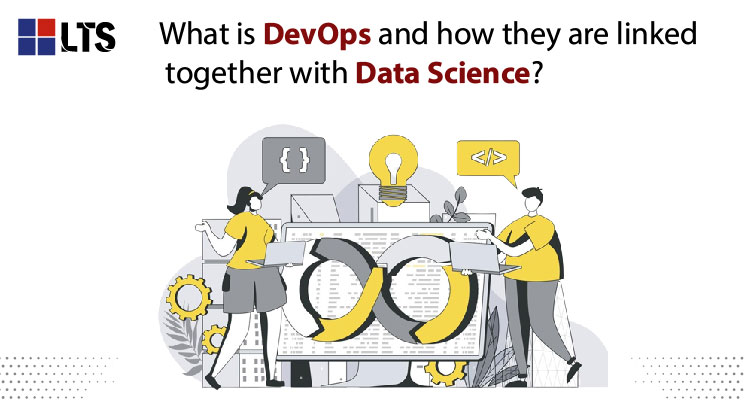- November 14, 2022
Leo Administrator
- in devops developer
- 0Comments
What is DevOps, and How are They Linked Together with Data Science?
When discussing machine learning and data science, we commonly associate these terms with statistics, algorithms, mathematics, data wrangling, and more. These tasks are critical to successfully implementing machine learning in an enterprise. However, there is one crucial feature that is growing in popularity. DevOps for Data Science sparks a debate about the importance of DevOps in data science. Mobile App Development is constructing a mobile application that operates on mobile devices.

LTS is a premier software development company operating for years, delivering top-class solutions to clients worldwide with the best IT services.
But why is DevOps important, and why is the term becoming more popular in the cloud industry? We also discuss the importance of DevOps in data science. Before we get into the details, please tell us about DevOps.
What is Big Data?
Big Data refers to large, complex data sets from various sources. Their volume and complexity are so great that they cannot be handled by traditional data processing software. On the other hand, such data can solve business tasks that standard data cannot.
Big data processing includes data acquisition and storage, sharing, analysis, digestion, visualization, transformation, and testing to deliver expected business value. Companies are experiencing tremendous pressure to implement demanding projects faster in a highly competitive marketplace. How can I provide all of this with maximum efficiency? This is where DevOps comes in, bringing in the right tools and practices.
What is DevOps?
DevOps is a methodology, culture, and practice to promote and improve communication and collaboration between development and operations teams. It focuses on automating and streamlining processes within a project’s development lifecycle.
The key pillars of DevOps are:
- Shorter development cycles.
- More frequent deployments.
- Faster releases.
- Parallel work by different experts.
- Regular customer feedback.
DevOps dramatically improve the speed, reliability, and quality of software delivery. These are a few reasons why DevOps is vital for software projects. A DevOps Developer must understand the concept of the software development lifecycle and other automation tools for developing digital pipelines.
Big Data and DevOps
You will notice no mention of data in the DevOps and Continuous Delivery discussion. And it’s true that by most traditional definitions, DevOps isn’t closely related to the field of data analytics.
But that’s how it should be. If DevOps aims to make, software production and delivery more efficient, including data specialists in the continuous delivery process can be a huge boon to companies working to adopt DevOps. A recent analysis shows that this is common in large companies.
Why Big Data Needs DevOps?
As mentioned earlier, big data projects can be challenging in that: Faster
Traditional approaches, unlike DevOps, need to be better suited to solving this problem. Traditionally, different teams and team members worked in isolation. For example, data architects, analysts, administrators, and many other professionals are working on parts of the job, slowing delivery.
On the contrary, DevOps brings everyone involved in all phases of the software delivery pipeline according to the above principles. Remove barriers, reduce silos between different roles, and make big data teams cross-functional. Not only does this significantly improve operational efficiency, but it also creates a more shared vision for project goals.
With all that said, it’s no wonder that embedding DevOps and involving data specialists in the CI/CD process is becoming standard practice among big data companies.
Minimal Error Risk
- The challenging nature of big data increases the chances of errors during software development and testing. DevOps can help minimize them. Thanks to continuous testing that starts early, errors can be detected in good time or prevented entirely. The project will likely reach the production phase without errors.
The software works as expected.
- When data specialists work closely with other specialists, they help them understand the details of the data the software interacts with in the real world. As a result, the actual behavior of the software closely matches its behavior in development and test environment software is very important given the complexity and diversity of real-world data.
Better Planned Software Updates
- Similarly, developers should work with data experts before writing code to gain a deep understanding of all types of data sources that big data applications need to use. To plan future software updates more effectively.
Streamlining Data-Related Processes
- Time-consuming processes such as data migrations and conversions can slow down projects. But combining software application and big data can help streamline them and deliver better data quality. Free from tedious processes, professionals can focus on their creative work.
Continuous Analytics
- Benefit from continuous analytics, which streamlines and automates the processes used to analyze data using algorithms, similar to continuous integration (CI), which is a crucial Aglie Software practice.
Complete and Accurate Feedback
- Once your significant data software is deployed in production, it’s time to gather real-time feedback on what’s working and not and its strengths and weaknesses. Again, thanks to the combination of Software Development and big data, close collaboration between administrators and data scientists can provide the most accurate feedback.
For more details : https://en.wikipedia.org/wiki/Azure_DevOps
The goal of DevOps is to make software production and delivery more efficient. Involving data specialists in the continuous delivery process can be a huge boon to companies striving to adopt DevOps. According to a recent analysis, the common practice is business. Despite being excluded from traditional thinking about DevOps, data analysts make essential contributions at every stage of the software delivery pipeline.
DevOps is a set of practices and tools and a cultural philosophy that automates and integrates the processes between software development and the IT team.
